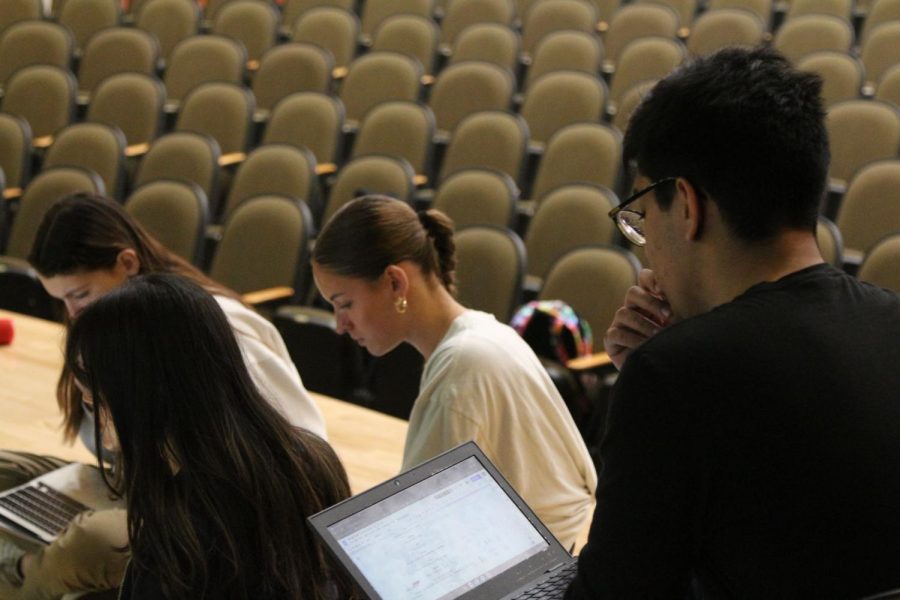Theater IV students make last-minute preparations for their chance in the spotlight during the upcoming Lenaea Festival
In pre-production for the upcoming Lenaea festival, Theater IV student Armaan Sharma reviews and discusses their One Act script with the class in preparation of being on stage. Photo by Liliana Galdarisi
Since the beginning of the school year, students in Theater IV have been writing and focusing on their individual pieces for the production of the Lenaea festival. The prime focus of the class focuses on creating the One Act Performance that will be presented in front of a panel of judges.
Since Ancient Greece, the Lenaea Festival has been an event in which thespians can practice their craft in the theater. Today, since 1956, the Lenaea Festival takes place at the Harris Center for the Arts at Folsom Lake College. The festival was reinstated by Sacramento State College to, “support and encourage theater arts programs at the high school level,” Lenaea Festival Director Scott Adams said.
Lenaea usually takes in around 60 to 70 schools from the Western United States, including high schools from Alaska and Hawaii. After four years of waiting, students from Theatre I to Theater IV finally get a chance to step into the spotlight.
“It’s just a lot of trial and error, especially when it comes to writing. I think we’ve been writing our One Act for two or three months now. It’s a lot of deleting, adding and workshopping it,” Morgan Kazel said.
The One Act that has been perfected for the Theater IV class consists of an approximately 30 to 40-minute narrative dramatic comedy that follows an adoptive family that celebrates their grandma as a funeral approaches. The by-product of this being clashing family emotions,“that most people can relate to,” Kazel said.
“I play an old man which is very, very fun and different for me because I never really get to play those kinds of characters. But you can kind of write yourself into whatever scenario you want to be [in] because you are in control of the show itself,” Kai La Point said.
Some students also get the chance to perform a monologue, musical solo or duo scene. For instance, Melia Lambert is doing a doing musical solo. Armaan Sharma and Leonor have duo scenes along with Josiah Roland and La Point, while students like Grace Scott are performing a monologue. They gained their parts through a process in which theater teacher Mr. Joshua Ansley assigned each person to what role would be best suited for them based on class-wide auditions.
On a student-to-student level, individual preparation is at a standard of high dedication to the art.
“It’s mostly, for me, just putting myself in that environment where I’m going to be judged constantly and I have to prepare mentally in order to provide the best performance that I can. It’s a lot of memorizing and rehearsing. I normally do it in the mornings and nights because that’s easiest for me because it’s fresh,” La Point said.
As the festival date approaches, the class spends their time continuously rehearsing during sixth period and trying to touch up performances. In their stage of dress rehearsals, they said they find it important to look for one or two things to improve on and reinforce each role through critiques.
The event is scheduled to include workshops where members from every realm of the theatrical industry are brought together. Professional dancers, singers, directors, customers, professors and experts will work and teach classes, which will continue through the weekend. What would normally be a high expense for students becomes an experience in which people passionate about theater are able to learn from those already connected to the larger theatrical realm. The event concludes with an evaluation in which judges give feedback on what could be improved upon.
“It’s an artistic realm, so you don’t see winners and losers. We finally get to go and see what other schools are like. What are their performances? What’s their program? What are people like? We don’t get to experience that except for going to the festival and really seeing how we measure up in some ways,” Ansley said. “Usually, students come back with a much greater understanding and a greater motivation for what they want to accomplish. I wish we could do more of them because it’s as valuable as probably two or three years of a class. It makes it a really, really neat experience for them.”
by NICOLE VALLITE, LILIANA GALDARISI and ELIAS WHITEHEAD









